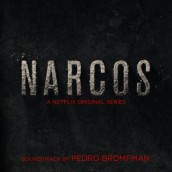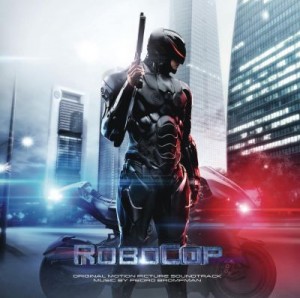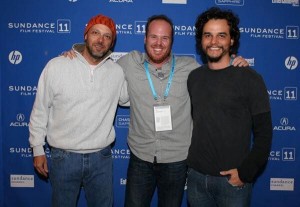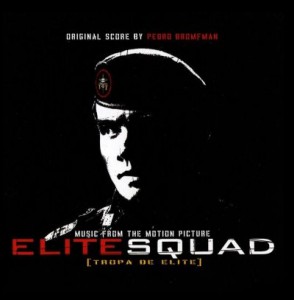Whether it’s a desperately poor person or the most sophisticated (and seditiously entertained) movie and TV watcher, nothing represents the ruthlessly swift, or successfully doomed path to the good life like The Drug Lord. Whether real or imagined, these captains of illegal industry represent the ultimate in charisma, cunning and seduction, everything it takes to keep enemies close, maintain armies of devoted followers and addict the public to your supply. From Mexico’s “El Chapo” to Cuba’s imagined Tony Montana, Latin America has been a hothouse region from which these enthralling villains have emerged, which makes Brazilian composer Pedro Bromfman especially fitting (though quite law-abiding) to keep company with these kingpins, foot soldiers, gun molls, informers and assorted flotsam as they wreak havoc on themselves and most tragically the innocent while rising to the top – an all the more spectacular place to fall when pushed by Bromfman’s music.
Exploding on the international crime scoring scene with the raw, violently energized rhythms that sprang from Brazil’s shantytown favelas to take on the ELITE SQUAD, Bromfman’s mix of South American instruments and sinister industrial grit helped bring filmmaker José Padilha’s morally ambiguous clash of “BOPA” cops and slum crooks international acclaim, especially with action enthusiasts. Brought to the Hollywood’s promised land, both men applied their energetic, scum-fighting skills to the rebooted, cyborg hands of RoboCop. Giving a metallic, cold take to the iconic character, Padilha and Bromfman scored both fan controversy and a decent global gross. But there’s nothing like the pure stuff, and now thankfully, these collaborators are on far steadier footing among their native, drug-poisoned roots as Padilha and Bromfman return to the global region that’s provided them with so much violent inspiration.
However, if you expect to hear, let alone see the kinetic flash-bang of the ELITE SQUAD films from Netflix and Gaumont’s NARCOS, Bromfman and Padilha have something far more unexpected to offer binge-watching addicts in this ten episode series. Driven by the wry narration of gringo DEA detective Steve Murphy (Boyd Holbrook), NARCOS traces the rise of Colombia public enemy #1 Pablo Escobar (Wagner Moura), a business-savvy thug whose offer of “Plata o plomo?” (“Silver, or lead?”) finds most people taking the more precious, non-lethal item, propelling him from a low-level trafficker in stolen items to the top of the cocaine food chain. Yet like such more polished predecessors as Michael Corleone, the fabulously rich Escobar has dreams of going legit as a political man of the people. And when those dreams are of course denied, Escobar shows himself to be the true, horrifying ruler of his beleaguered country.
Much like this quietly vicious mobster, NARCOS is told with unusual restraint for this visceral crime-does-not-pay genre, especially in Bromfman’s hypnotic score. With a distinctive, thematic tapestry that gives shape to this decades-spanning story, Bromfman mixes indigenous Latin American rhythms and melodies with intoxicating synths, musical styles that blend flawlessly – much like Escobar’s ingenious ways of mixing cocaine with plastics, or the human body in order to transport his deadly cargo past the border. Percussion keeps the chase’s tension high as Steve and his DEA partner Javier (Pedro Pascal) stay one maddening step behind the seemingly uncatchable Escobar, hamstrung by a CIA more interested in bagging Commies than the drug runners who are the real threat to America. Bromfman’s calculating, yet often languorously tropical approach convey a good life built on bloody death, yet always threatened on the edge of collapsing. It’s a combination of devilish, breezy assurance suspense and tragedy that’s positively serpentine in its effectiveness, a surprisingly laid-back approach that’s all the more menacing for being cool in the face of the death, personifying an evildoer who can easily switch from being the devil to a caring family man. Like Escobar’s product, Bromfman’s mesmerizing score gets under the skin to truly disturbing, euphoric effect, marking him as one of NARCOS most effective dealers.
ASSIGNMENT X: Growing up in a radically socially stratified place like Brazil, at what age did you notice the difference between the desperately poor and super rich, and the lengths the destitute would go to escape poverty – let alone the extremes that the law would go to stop them? What did you think of the situation?
PEDRO BROMFMAN: This is such a loaded and complicated question. Growing up in Brazil you’re aware of the social dichotomy from a very early age. You’re also aware of your surroundings, learning to read what’s going on at the beach, on the streets, when kids growing up in the US are probably completely unaware. At the same time most lines are a bit blurred in Brazil. I feel like there’s a lot more, and certainly friendlier, interaction between people from different social classes, races and religion. Also, Brazilians in general seem much less afraid, even though there’s probably a lot more to fear. They seem more laid-back and relaxed facing their daily struggles.
AX: Creatively, when did you notice the power of film scores? And was it something you determined to do before you set off to study music in America at the Berklee College of Music?
BROMFMAN: The first time I was really moved by a film score, was when my dad took me to see CINEMA PARADISO in Rio. I was probably 13 years old, I had gotten my first guitar at age 10 but didn’t really start formal lessons until probably that same year (1989). Music was always an important part of my life. My mom had dreamed of being a singer, but she passed away when I was 10 years old. Looking back, her passion for music was a driving force in my career. I did not study film scoring at Berklee and had no idea this would be my path and passion years later.
AX: What kind of musical training ground was working on The Oprah Winfrey Show, A BABY STORY and ESPN shows in the American market?
BROMFMAN: Those early shows as well as working on music libraries and trailer music were essential in helping me develop my chops. They especially helped me deal with music technology, which I I started playing around with 15 years ago, just before moving to LA, but truly dove into once I arrived. I had to catch up on recording and engineering techniques as well as learning to create music with a computer, something I had never done until I was 23, as I had grown up playing instruments and writing jazz and Brazilian music with arrangements on paper.
AX: The real international game changer for you was working on 2007’s ELITE SQUAD films. Could you talk about creating their scores, and how your approach might have changed as the characters got significantly darker in the 2010 sequel ELITE SQUAD: THE ENEMY WITHIN?
BROMFMAN: The ELITE SQUAD movies were certainly game changers for me. Those movies travelled and won awards around the world, opening up a lot of opportunities. They were also the beginning of a long friendship and collaboration with José Padilha. I was in Brazil this week for a movie I’m working on and for the Netflix premiere of NARCOS, and I caught ELITE SQUAD on TV. I hadn’t watched that movie in 7 years and I couldn’t turn it off. It has such raw energy and I’m extremely proud of what we did (as are most Brazilians). But at the same time, it makes me realize how little I knew at the time and how much I’ve grown since as a film composer. I think part of the chaotic energy and originality of the first ELITE SQUAD had to do with our lack of experience. The tiny music budget and having never done an action-suspense score before, were also a big part of the music being what it is. I was brought in primarily for my experience as a music producer, since we needed to re-record songs and work with Brazilian Funk artists, a samba school, etc…
I think my experience through those two films mirrors the experience of our main character in ELITE SQUAD,obviously in a totally different field and with completely different stakes. In the first movie, Nascimento is a young and very aggressive Bope officer, trying to figure things out but thinking he understands the situation in Rio and hat he’s prepared to tackle it. In the second movie he is more sophisticated. He understands how things work and he goes about his business with more finesse, even though in the end the shit still hits the fan and we get a bit of the young Nascimento doing what he does best. My experience and the instrumentation we used allowed us to intentionally mirror that. The second score is certainly more sophisticated, we have strings and some brass but we preserve the electric guitar, raw percussion and aggressive energy from the first movie.
AX: Did the ELITE SQUAD scores set you up for your first major series NARCOS? And how important was it for you that this series take its own musical path, especially given the arch of its ten episode run?
BROMFMAN: I think every project I work on sets me up for the next thing. Through the experience gained, professional relationships and my development as a composer and a human being. I literally believe that every step in my musical career is somewhat connected, and one thing feeds the next even if they seem completely unrelated. The instruments I grew up playing, my studies of Jazz, Brazilian music, Tango, Classical music, my experience as a music producer, arranger, self-taught engineer, they are all contributed to the composer I am today. I’ve always been a very eclectic musician and that also feeds my desire to re-invent myself and to try and create different music every time I approach a new job.
AX: NARCOS is strongly thematic, especially for how long the series runs. With so many characters, how did you decide whom the most important ones were to hit?
BROMFMAN: Yes it is. Fortunately, I was involved with NARCOS from the very beginning and reading the first few episodes, before they even started shooting, allowed me to start exploring musically with a great understanding of who our characters were and what the music needed to be. Most of those themes written in the very early stages, ended up being the main themes throughout NARCOS. After writing those pieces last fall, I stayed away from the show for most of the shoot. It was fascinating to be able to go back to the music I had crated months before and to play around, explore and develop those themes over 10 episodes. Of course a lot of new music had to be composed after that but the tone and instrumentation were set very early on.
AX: With NARCOS taking place all over the South American map, was it a welcome opportunity to bring together musical instruments and cultures from the region, and which ones did you want to highlight? Did you create a “suite” of ideas of you will before even starting
BROMFMAN: I play a lot of those South American instruments and, for this show I also tried playing a lot of instruments I had never played before. Besides percussion, almost 100% of the sounds and instruments you hear on NARCOS were performed by me. I focused on Colombia, not necessarily Colombian rhythms, but writing a suspense/action score using those instruments and language. Obviously, being from Brazil, some of my roots certainly seeped into the music as well.
AX: Did you do any research on the Medellin Cartel before starting the series? And if so, what did you find most striking about Pablo Escobar’s run as South America’s most-wanted drug kingpin?
BROMFMAN: I did talk to José about the history and scope of the Medellin Cartel and I read the scripts, a true history lesson. Growing up in Brazil, I was familiar with how tough things were in Colombia for part of the 80s and 90s. It still amazes me the power that Escobar and the Medellin Cartel had over Colombia and its leaders at the time. Escobar was certainly an evil guy but, at the same time, he was adored by the poor and by his family. He became a politician at one point in his life and claimed someday he’d be the president of Colombia.
AX: It’s usually drug-trafficking gangsters that capture the public’s fascination like SCARFACE’s Cuban “immigrant” Tony Montana, who achieve the high-living American dream. How did you want your music to capture the “good life” aspect of being a drug kingpin, while also playing the brutality that leads to the top?
BROMFMAN: Escobar was a true dichotomy, a family man, a politician, a drug lord, a murderer, and the Robin Hood paisa. He has three themes in the show representing some of those different personalities. One of those themes is also played as a theme for Colombia and the hopes he claimed to have for the country. In the beginning of the show you see a tough guy and a very smart businessman who is certainly willing to kill people to get things done. As the show goes on you start to see his downfall into madness, becoming a completely unpredictable and truly vicious man. Escobar’s music, and the music for the show in general, gets darker as we move though the episodes. Even though we deliberately decided not to glorify Escobar, the audience has to embark on a journey with him. They have to “root” for him at times and feel his pain when he loses a family member or a close friend. Therefore his music also had to be emotional, with a deep sense of longing. Things didn’t really turn out the way he had planned. “Narcos” for me was a fascinating and constant search for the right musical tone.
AX: When you’ve got law enforcement often behaving like criminals to catch the “bad guys” in ELITE SQUAD and NARCOS, how did you want to play that sense of cloudy morality?
BROMFMAN: Again, there are no black or white characters in this show. Everyone falls into a grey area and they’re all willing to do what they believe they have to, in order to accomplish their goals. In ELITE SQUAD we had a police officer that behaved in very questionable ways but we were always looking at it from his perspective. With Nascimento being the hero of the story. In “Narcos,” the characters, and consequently the music, had to play all sides of the story. We, as audience members, find ourselves rooting for Escobar and Murphy, the DEA agent embedded in Colombia, at the same time.
AX: How do you think the score plays the tragedy of both law enforcement and criminals, who are essentially caught in a chase with no end?
BROMFMAN: That was one of the things I set out to do. The sense of dread and longing even when I was writing a beautiful piece or an action sequence; the overall dark mood of the score, the hypnotic effects with very little harmonic movement in a lot of the darker pieces. The throwback to spaghetti western scores, with the punctuating percussion and harmonicas. At the same time, like you mentioned before, “Narcos” has a very melodic and sometimes sweet score. We didn’t want to hit people over the head and tell them what they should feel. I set out to create a sound world for these characters to inhabit and the differentiation between characters is done thematically and not necessarily through different instrumentation and sounds.
AX: There’s a mellow, almost hypnotic contrast between shimmering electronics and indigenous Latin instruments and percussion in NARCOS. How did you hit upon that mix?
BROMFMAN: Every instrument and every sound you hear in NARCOS is organic and original to the show. We didn’t use a single Omnisphere pad or software library. Juan Carlos Enriquez helped me create an extensive library of original Kontakt instruments for NARCOS. We did a long sampling session in the beginning of the process, recording myself playing percussion, charangos, ronrocos, viola caipira, upright bass, flutes, accordion, harmonicas, melodicas, hang, etc… We experimented bowing, banging, scratching and ebowing several of those instruments and Juan Carlos edited the audio we selected, creating these amazing instruments that permeate the show. These software instruments we created were then processed, played backwards, distorted, but their source is 100% acoustic. NARCOS also has a boatload of percussion, several grooves featuring my good friend and great musician Cassio Duarte. I tend to rely heavily on percussion in most of my scores whether it is RoboCop or NARCOS.
AX: Do you think there’s a universal “language” when it comes to scoring crime? What were your favorite scores in that genre, and did they at all influence NARCOS?
BROMFMAN: I don’t think there is necessarily a language in scoring anything but certainly our ears and experiences sometimes bring us to common places. Conceptually, my main inspiration in setting out to do this score, were the Morricone westerns. I felt there were a lot of parallels between the Colombia we see on screen and the western towns under the stranglehold of outlaws. Obviously Colombia had a much bigger and more complicated situation.
AX: Could you talk about the role of percussion in NARCOS’ eerier, and more suspenseful moments?
BROMFMAN: The percussive punctuation is something always very present in my scores. It probably comes from my Brazilian roots and my limited ability as a percussionist, it’s much easier to make noise than to groove on percussion. On NARCOS, I think the percussion reinforces that Western feel. The score doesn’t necessarily sound like a traditional western, due to our unique instrumentation, but that conceptual thought was there from the beginning. Percussion is also an extremely effective tool in scoring action and building suspense.
AX: How did you want to get across the period setting of NARCOS in terms of the kind of music that these drug kingpins and their minions would be grooving to in the 80s and 90s?
BROMFMAN: To be honest, apart from a couple of cues, we didn’t worry much about setting the score musically in the eighties and nineties. There are a couple of funky pieces, with wah wah guitars, that were done with that in mind. However, musically speaking, most of the period setting was done through the source licensed for the show.
AX: With the first few shows heavily driven by Steve’s sardonic narration, how important was it for the score to be able to play with the dialogue that also serves as our “history lesson” of the narco wars?
BROMFMAN: Very important! My experience working with José on the ELITE SQUAD films, taught me a lot about dealing with narration. Sometimes we’d be spotting a scene or playing back music I had written for a sequence and José would be asking me about the narration that used to be there and why it no longer was. He could probably recite the narration of all of his movies back to you. Those lines are there for a reason, they are important to him and to the audience’s understanding of the story and my job is to complement and support them. If I write something that’s making it difficult for the audience to understand the narration my music will be lowered or elements will be cut in the final dub.
AX: Before NARCOS, what was it like playing the Internet criminals of Alex Winter’s documentary DEEP WEB, and do you see any kind of kindred spirit with the far more physical evildoers your music has explored?
BROMFMAN: DEEP WEB also has a generally dark score, probably darker than NARCOS, and certainly less melodic. It’s much more electronic, full of pulses and synthetic mallets. DEEP WEB tells such a tragic story of a brilliant kid who lost his way and his family trying hard to prove his questionable but possible innocence. One thing is certain, my emails are being read and flagged by law enforcement somewhere ![]() This year most of them talked about narcos, drugs, The Silk Road, Dread Pirate Roberts, Escobar, DEA, etc…
This year most of them talked about narcos, drugs, The Silk Road, Dread Pirate Roberts, Escobar, DEA, etc…
AX: Your first Hollywood score (not to mention the movie) for the RoboCop reboot drew a lot of controversy for being so radically different from Basil Poledouris’ music. In reflection, even with the opportunity it presented, do you think it was a “doomed” project to attempt no matter the quality of the score as your heard it?
BROMFMAN: I’m very proud of RoboCop and the music I created for it. I think if the project had been called RoboOfficer and was not released as a reboot, people might have looked at it and judged it for what it is. I know how much blood, sweat and tears we all put into it and, in the end, we made the film we set out to make, with José fighting for his vision all the way through. It was upsetting that the film and score were attacked and dismissed from the very beginning, most times by people who didn’t even see the film. Critics and hardcore fans don’t necessarily understand the process of making a blockbuster film, the hurdles and pressures involved. They also don’t understand that a score like Basil’s, unfortunately would never be approved in a modern Hollywood film. I’m certainly a huge fan and I fought to find a place for his theme in our movie but this was a very different RoboCop, and it needed a very different score. I did my job and managed to please my director and both studios behind the film and that’s what I set out to do. People also forget the movie did $250 million dollars in worldwide box office. It certainly wasn’t a flop.
AX: With so much darkness that you score, do you welcome the chance to get to play the romantic side of Brazil in films like RIO, I LOVE YOU which goes back to the far more pleasant ideal that people had of the capital before the likes of CITY OF GOD.
BROMFMAN: Believe it or not, when I arrived in LA and started writing library and trailer music, I seemed to primarily get called for romantic comedy tracks and sweet melodic music. That’s certainly changed! As I mentioned before, being an eclectic musician, having loved and played so many different styles of music, I do enjoy opportunities to re-invent myself and to dip my toes in different musical pools.
AX: Why do you think Pablo Escobar seems to be the rage now with so many projects like ESCOBAR: PARADISE LOST?
BROMFMAN: Escobar is truly a fascinating character! Colombian history in the late 80’s and early 90’s is surreal and unimaginable for most people today. You can’t make up some of the things you see on screen, no one would believe it. I think as people become more familiar with his story they are compelled to know more. Maybe some time has gone by and people are ready to digest it as entertainment, I’m not really sure… His story certainly has many ingredients moviegoers seem to love: sex, drugs, money and plenty of violence.
AX: What kind of opportunity do you think that unusual “channels” like Netflix are giving to composers in terms of their musical approaches? Do you think there’s even more freedom there?
BROMFMAN: I think there’s a lot more freedom in dealing with Netflix. They seem to hire the people they trust creatively, people they want to be in business with, and let them do their jobs. Netflix approves an entire season before a single episode is shot. I believe they are not as dependent on the success of a single show, allowing them to take more risk. I had a tremendous experience with Netflix and Gaumont on this show. It was truly relaxed and hassle-free musically speaking. I worked closely with José in the beginning and, as we moved through the episodes that other directors had worked on, I dealt with Chris Brancato and Eric Newman, whom I had also worked with before on RoboCop. I believe we found the tone everyone was looking for in the music from the very beginning and everything flowed very smoothly from there.
AX: Do you think there’s any real stopping of the drug wars and the bloodshed they spread across South America? And do you think the rage that candidates like Donald Trump have towards the people who are driven to flee it as much as they are hoping for a better opportunity should have that anger directed towards them – especially as you are a legal, musical immigrant?
BROMFMAN: If there’s one thing I learned from working with José is that, as long as there is demand there will be supply. It might shift around as one country “cleans up their act” but, if there is a thriving market for illegal drugs somewhere in the world, there will be drug dealers and kingpins. Drug empires will rise and fall as we move through time but they won’t cease to exist unless people are not buying drugs or can get them legally. As for the anger towards immigrants, luckily I’ve never felt it on my skin. I’ve always been treated properly and have been given innumerous opportunities here in the US. It’s sad to think that most of the people who might experience that prejudice and anger are much harder working people than you and me. Honest individuals who came to the US to try to support their families.
AX: Though you’re in Hollywood now, how do you see your career continuing on with your specialty in crime scoring, while also taking on more diverse subjects?
BROMFMAN: I’m very happy and realize how lucky I am to have the opportunity to compose music for a living. My main goal is to continue to work on projects that fascinate me, whether they are documentaries, TV shows or Hollywood movies. Although my main focus is the US market, I’d love to continue to work on quality shows in Brazil and Europe, as I’ve done until now. I certainly don’t shy away from scoring crime and drugs but I’m also very opened to different opportunities. As I finished NARCOS I became a father and I’d love my daughter to be able to watch something I’ve worked on before she’s old enough to handle NARCOS or ELITE SQUAD!
Watch NARCOS on Netflix Instant HERE, and listen to Pedro Bromfman’s score digitally on Lakeshore Records HERE, with a physical CD to be released October 2nd HERE
Listen to Pedro Bromfman’s scores to ELITE SQUAD HERE
Visit Pedro Bromfman’s website HERE
Follow us on Twitter at ASSIGNMENT X
Like us on Facebook at ASSIGNMENT X
Article Source: Assignment X
Article: Interview with NARCOS Composer Pedro Bromfman on the new Netflix series
Related Posts:

















